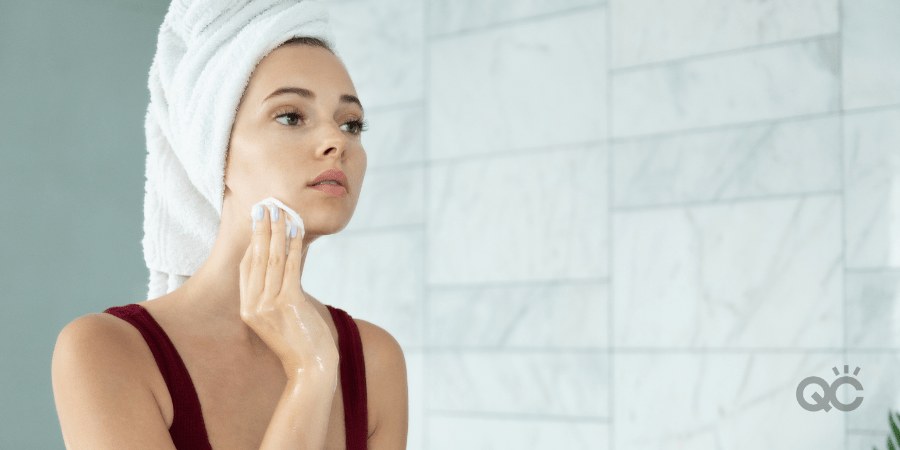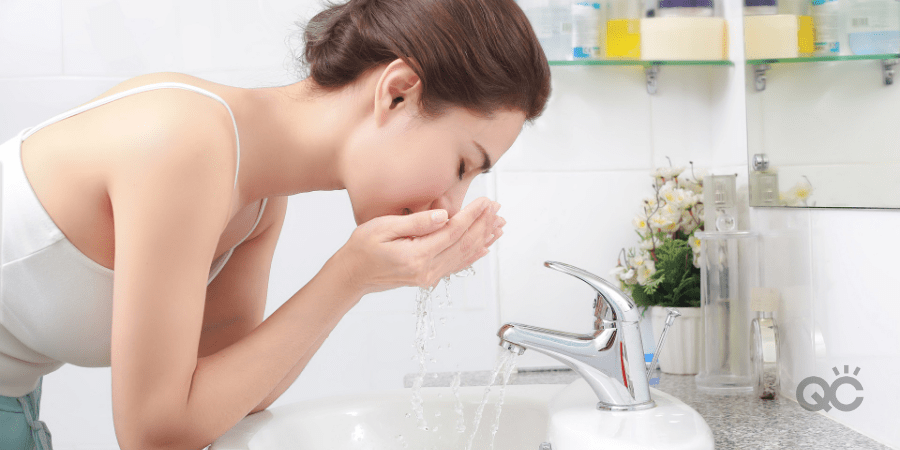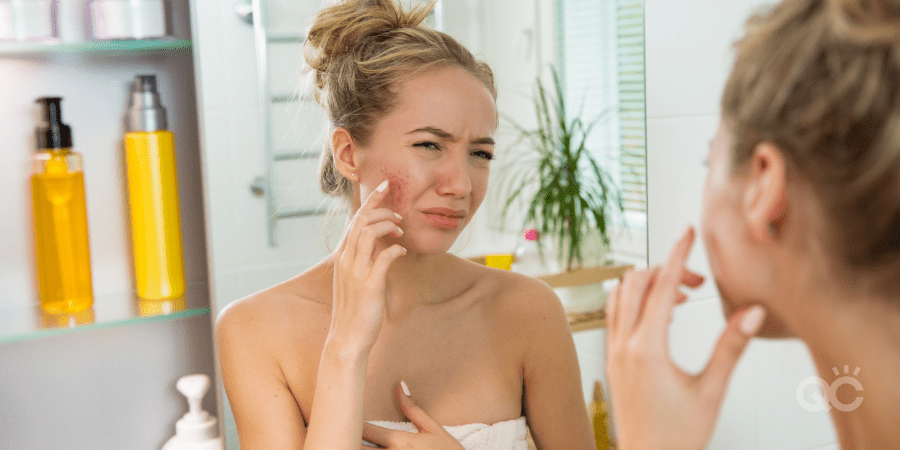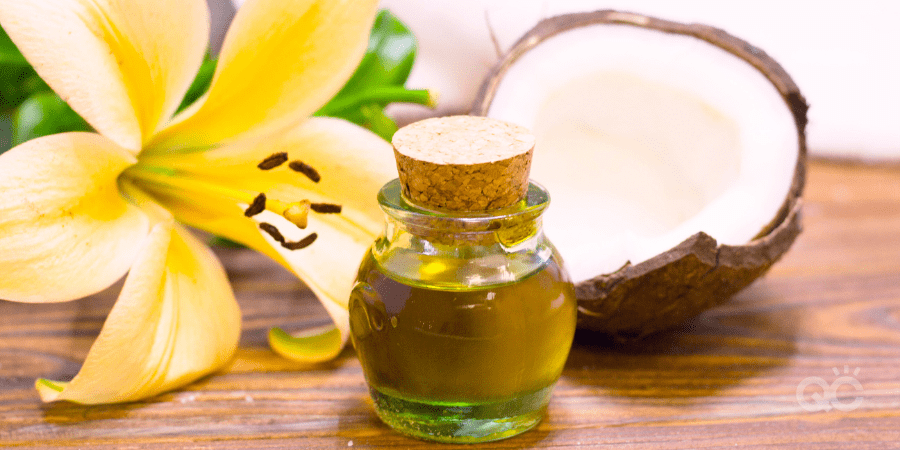I’ve been using makeup remover wipes and similar products over the course of my whole life. I’ve tended to look over the fact that they sometimes irritated the sensitive skin around my eyes, or left my cheeks unnaturally dry.
Not to mention, the amount of pressure alone that’s required to scrub off a smoky eye is always enough to leave my face downright raw.
If I’m being honest, makeup removers often leave my skin feeling straight-up gross. When I stop and think about it… Should anything masking itself as a skincare product really be making my skin feel this way?
So, I decided to do some digging. As it turns out, makeup removers aren’t nearly as good for our skin as we think they are. That’s not necessarily to say that EVERY makeup remover should be avoided. Rather, it may simply be time to be a little pickier about the product we choose – or perhaps switch to a natural alternative altogether.
Let’s take a look at some of the reasons why certain makeup removers are damaging to our skin, and the healthier options that are at our disposal!

Makeup Removers Aren’t Adequate Cleaning Products
Plenty of makeup removers out there claim to be multipurpose skincare products; capable of cleaning off your makeup and cleaning your skin. Unfortunately, for most brands, only the first promise is actually kept.
Yes, makeup removers are good at doing exactly that: removing your makeup. But they do a lousy job of actually cleaning your skin itself.
This is in large part because makeup remover wipes have a tendency to smear makeup, dirt, and dead skin over the epidermis (the outer layer of your skin), rather than properly removing them from the skin’s surface. For many of us, this is a big reason why our skin feels so irritated afterwards.
If we’re thinking strictly in terms of what a proper skincare routine is supposed to do, this seems a bit counterproductive, doesn’t it?
Makeup Removers Can Leave Behind Grime on Your Skin
Here’s the thing: it’s true that makeup removers and actual cleansers share the same active ingredients: surfactants, emulsifiers, and solubilizers. These are the things that dissolve your makeup, lift oil, and remove dead skin.
The key difference is that when you use a cleanser, you rinse afterwards. This is crucial to actually removing these unwanted things from your skin. With makeup removers, on the other hand, a lot of us have a tendency to skip this critical step.
This also adds to why your skin may feel uncomfortable in the aftermath. If you don’t properly clean away all those active ingredients in the makeup remover, they’re going to continue sitting on your skin, often in high concentrations.
So, should you wish to remain faithful to your makeup remover wipes, feel free to do so. But you might want to start thoroughly rinsing your face afterwards – otherwise, there’s still an adequate layer of grime still lingering in your pores.

Makeup Removers Often Contain Worrisome Ingredients
In order to increase shelf life, many makeup removers contain added – and unwanted – preservatives. Particularly, they may have formaldehyde-releasing chemicals. To put this into perspective: formaldehyde is classified as a carcinogen when under high exposure, and carcinogens can eventually lead to things like cancer.
Maybe this is a bit of a stretch. Still, even if we step back and look through a more realistic lens, there are other causes for concern.
For starters, many makeup removers contain alcohol, which is known to be particularly drying to skin. If you happen to have dry or sensitive skin, this is one of the last things you want to be coating all over your face!
Some other common examples of worrisome ingredients often found in makeup removers include:
- Mineral Oil – This is the holy grail ingredient in most makeup removers that does the job of actually removing your makeup. If properly rinsed and wiped away afterwards, this in itself isn’t so bad. However, if it’s left behind on your skin, it clogs the pores and makes it unable for the skin to breathe. Hello, breakouts!
- Sodium Lauryl Sulfate and Diazolidinyl Urea – Both can be prone to causing irritation, swelling, redness, and even allergic reactions.
- Cyclopentasiloxane – While it claims to promote healthy skin regeneration, it’s also considered a mild carcinogen.
- Benzalkonium Chloride – This is a very common makeup remover ingredient that just so happens to be banned in both Japan and China. This should probably tell us everything we need to know.
I’ve got to be honest, all of these ingredients sound shady in one way or another. If you wouldn’t be comfortable ingesting them (and I can definitely say I wouldn’t), why would you risk putting them on your skin?

There are Healthier Alternatives!
This article isn’t meant to completely bash makeup removers as a whole. There are ones out there that do their job without compromising your skin. If makeup removers are a staple in your skincare routine and you have no interest in changing that, maybe it’s just a matter of switching things up a bit.
First, try to ditch the makeup wipes altogether. Sure, you can have some on-hand in case of an emergency, but your skin will benefit from removing them from your regular routine. Instead, switch to a different type of makeup remover product, such as an oil or serum.
This part’s important: aim for products that ONLY have natural ingredients! Choose unscented products, or ones whose fragrant component is made from natural resources.
I was once told, “If an ingredient is so long and complicated that you can’t pronounce it, it’s probably an unwanted chemical.” I try to keep this in mind when purchasing any beauty product.
Here are 3 examples of brand-name makeup removers that are made from 100% organic ingredients:
- MV Skincare Pure Jojoba Oil
- Aromatica Natural Coconut Cleansing Oil
- La Foglia Lavendar Makeup Remover
I’ll let you in on a fun little secret, though: there are natural makeup removers that are not actual cosmetic products, but they work just as effectively AND will often cost you next to nothing!
For instance, did you know that sesame oil and coconut oil can both be used to effortlessly wipe away your eye makeup? It’s true! Coconut oil can also be used as a general makeup remover, too.
(Let’s be real… Is there anything coconut oil can’t do?)
Plus, you can also add things like organic raw honey to these all-natural makeup removers, to add extra softness! Raw honey contains antibacterial, anti-septic, and antioxidant properties. It helps promote healthy collagen growth, and is known to be extremely hydrating.
If you want to see just how awesome raw honey is as a skincare alternative, check out this blogger’s experience washing her face with nothing but raw honey for 2 weeks!

Proper Skincare Training is Important
In retrospect, I can probably chalk up my negative experience with makeup removers to a lack of proper skincare knowledge. I mean, just look at how much I learned through a simple Google search! Imagine how much more I’d discover if I took a legitimate skincare course from an accredited makeup school!
Proper skincare courses will not only teach you about various skin types, products, and what works best for which kinds of skin – it’ll also qualify you to work as a certified Skincare Consultant. You’ll be able to use all that education and knowledge to help others for a living!
As it so happens, I’ve actually just enrolled in QC Makeup Academy’s leading online Skincare Course. I intend to get started within the next week. Pretty exciting stuff!
As I work through the program, I’ll ensure to check back in to share my thoughts on the course, and provide an update on all the amazing stuff I’m learning! So, make sure to stay tuned! 😊
